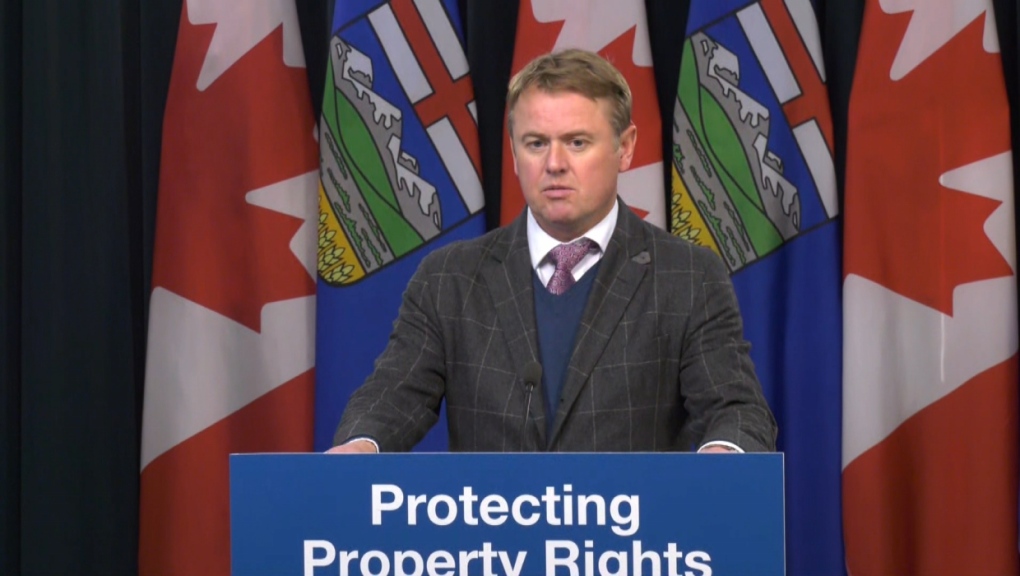UCP hopes to eliminate 'squatters rights' in Alberta
 Tyler Shandro says The Property Rights Statutes Amendment Act, 2022, would abolish the ability of squatters to make a claim and give private landowners the same protections once only reserved for government.
Tyler Shandro says The Property Rights Statutes Amendment Act, 2022, would abolish the ability of squatters to make a claim and give private landowners the same protections once only reserved for government.
Alberta's UCP government wants to get rid of the province's so-called "squatter's rights."
Minister of Justice Tyler Shandro announced the Property Rights Statutes Amendment Act, 2022, on Monday.
If passed, the bill would amend the Law of Property Act, the Land Titles Act and the Limitations Act, eliminating Alberta's adverse possession laws.
Currently, the laws allow a person who has occupied another person’s land for 10 years to claim ownership of that land. Claims can only be made against private landowners; public land, municipal land and irrigation districts are exempted.
"This is not the first time that a bill has been introduced in Alberta's legislature to abolish adverse possession," Shandro said Monday. "There have been previous attempts to make this change through private members bills, but none of them have been successful."
"I hope this time will be different, because Albertans have been saying that they want this change for over a decade."
Adverse possession laws have often been used in land disputes in rural areas, where property lines may be unclear.
"Possession" can mean anything from building a fence that cuts through someone else's property to actually living on someone's land.
Existing laws say anyone "occupying" someone else's land must be doing it visibly, excluding the actual land owner from using it, and the land owner must be aware of it.
"If passed, this act will bring peace of mind to Alberta's landowners, it will allow them to use and enjoy the land that they rightfully own without having to worry about whether someone can take it away," said Shandro.
"Updated legislation would send the clear message that there is nothing to be gained from squatting on someone's land."
CTVNews.ca Top Stories

Ottawa injects another $36M into vaccine injury compensation fund
The federal government has added $36.4 million to a program designed to support people who have been seriously injured or killed by vaccines since the end of 2020.
'Secret report' or standard research? B.C. government addresses safe supply allegations
B.C.’s premier and one of his top lieutenants are pushing back against allegations by the Official Opposition that he covertly commissioned a report into the diversion of safe supply drugs onto the streets.
Video shows suspects waving weapons, smashing glass in Toronto jewelry store robbery
Arrests have been made after five men were captured on video rampaging through a jewelry store in Toronto, waving weapons and smashing glass display cases.
'My stomach dropped': Winnipeg man speaks out after being criminally harassed following single online date
A Winnipeg man said a single date gone wrong led to years of criminal harassment, false arrests, stress and depression.
She was too sick for a traditional transplant. So she received a pig kidney and a heart pump
Doctors have transplanted a pig kidney into a New Jersey woman who was near death, part of a dramatic pair of surgeries that also stabilized her failing heart.
What Canadians think of the latest Liberal budget
A new poll suggests the Liberals have not won over voters with their latest budget, though there is broad support for their plan to build millions of homes.
opinion Why you should protect your investments by naming a trusted contact person
Appointing a trusted person to help with financial obligations can give you peace of mind. In his personal finance column for CTVNews.ca, Christopher Liew outlines the key benefits of naming a confidant to take over your financial responsibilities, if the need ever arises.
'One of the single most terrifying things ever': Ontario couple among passengers on sinking tour boat in Dominican Republic
A Toronto couple are speaking out about their 'extremely dangerous' experience on board a sinking tour boat in the Dominican Republic last week.
Teacher shortages see some Ontario high school students awarded perfect grades on midterm exams
Students at a high school in York Region have been awarded perfect marks on their midterm exams in three subjects – not because of their academic performances however, but because they had no teacher.































